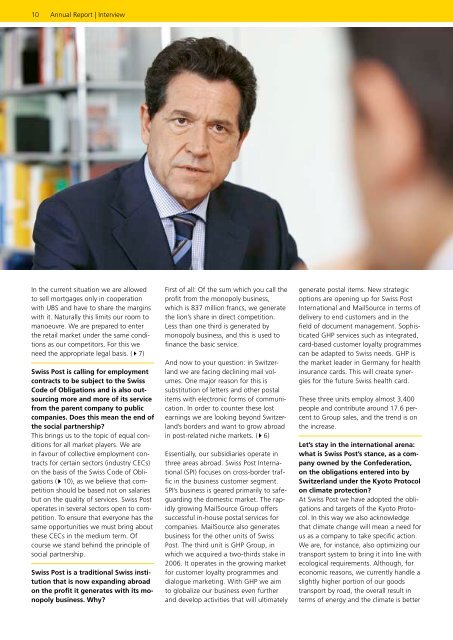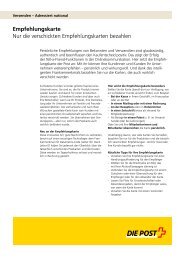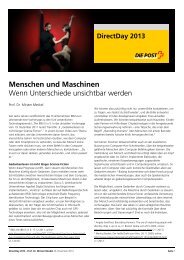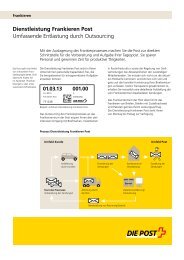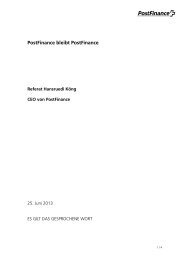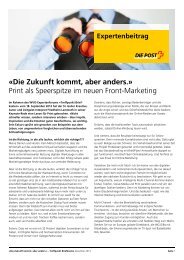Service-oriented - Die Schweizerische Post
Service-oriented - Die Schweizerische Post
Service-oriented - Die Schweizerische Post
You also want an ePaper? Increase the reach of your titles
YUMPU automatically turns print PDFs into web optimized ePapers that Google loves.
10 Annual Geschäftsbericht Report | Interview 2006<br />
In the current situation we are allowed<br />
to sell mortgages only in cooperation<br />
with UBS and have to share the margins<br />
with it. Naturally this limits our room to<br />
manoeuvre. We are prepared to enter<br />
the retail market under the same conditions<br />
as our competitors. For this we<br />
need the appropriate legal basis. ( 7)<br />
Swiss <strong>Post</strong> is calling for employment<br />
contracts to be subject to the Swiss<br />
Code of Obligations and is also outsourcing<br />
more and more of its service<br />
from the parent company to public<br />
companies. Does this mean the end of<br />
the social partnership?<br />
This brings us to the topic of equal conditions<br />
for all market players. We are<br />
in favour of collective employment contracts<br />
for certain sectors (industry CECs)<br />
on the basis of the Swiss Code of Obligations<br />
( 10), as we believe that competition<br />
should be based not on salaries<br />
but on the quality of services. Swiss <strong>Post</strong><br />
operates in several sectors open to competition.<br />
To ensure that everyone has the<br />
same opportunities we must bring about<br />
these CECs in the medium term. Of<br />
course we stand behind the principle of<br />
social partnership.<br />
Swiss <strong>Post</strong> is a traditional Swiss institution<br />
that is now expanding abroad<br />
on the profit it generates with its monopoly<br />
business. Why?<br />
First of all: Of the sum which you call the<br />
profit from the monopoly business,<br />
which is 837 million francs, we generate<br />
the lion’s share in direct competition.<br />
Less than one third is generated by<br />
monopoly business, and this is used to<br />
finance the basic service.<br />
And now to your question: in Switzerland<br />
we are facing declining mail volumes.<br />
One major reason for this is<br />
substitution of letters and other postal<br />
items with electronic forms of communication.<br />
In order to counter these lost<br />
earnings we are looking beyond Switzerland’s<br />
borders and want to grow abroad<br />
in post-related niche markets. ( 6)<br />
Essentially, our subsidiaries operate in<br />
three areas abroad. Swiss <strong>Post</strong> International<br />
(SPI) focuses on cross-border traffic<br />
in the business customer segment.<br />
SPI’s business is geared primarily to safeguarding<br />
the domestic market. The rapidly<br />
growing MailSource Group offers<br />
successful in-house postal services for<br />
companies. MailSource also generates<br />
business for the other units of Swiss<br />
<strong>Post</strong>. The third unit is GHP Group, in<br />
which we acquired a two-thirds stake in<br />
2006. It operates in the growing market<br />
for customer loyalty programmes and<br />
dialogue marketing. With GHP we aim<br />
to globalize our business even further<br />
and develop activities that will ultimately<br />
generate postal items. New strategic<br />
options are opening up for Swiss <strong>Post</strong><br />
International and MailSource in terms of<br />
delivery to end customers and in the<br />
field of document management. Sophisticated<br />
GHP services such as integrated,<br />
card-based customer loyalty programmes<br />
can be adapted to Swiss needs. GHP is<br />
the market leader in Germany for health<br />
insurance cards. This will create synergies<br />
for the future Swiss health card.<br />
These three units employ almost 3,400<br />
people and contribute around 17.6 percent<br />
to Group sales, and the trend is on<br />
the increase.<br />
Let’s stay in the international arena:<br />
what is Swiss <strong>Post</strong>’s stance, as a company<br />
owned by the Confederation,<br />
on the obligations entered into by<br />
Switzerland under the Kyoto Protocol<br />
on climate protection?<br />
At Swiss <strong>Post</strong> we have adopted the obligations<br />
and targets of the Kyoto Protocol.<br />
In this way we also acknowledge<br />
that climate change will mean a need for<br />
us as a company to take specific action.<br />
We are, for instance, also optimizing our<br />
transport system to bring it into line with<br />
ecological requirements. Although, for<br />
economic reasons, we currently handle a<br />
slightly higher portion of our goods<br />
transport by road, the overall result in<br />
terms of energy and the climate is better


